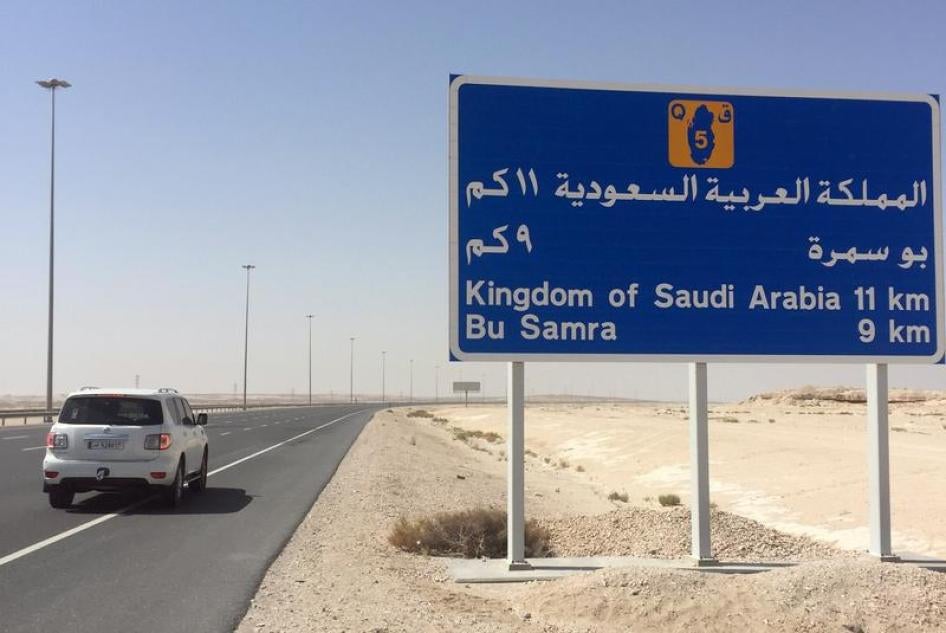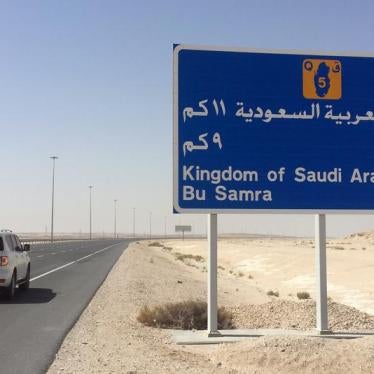The age-old adage that finds opportunity in every crisis is truer than ever in Qatar today. No doubt the Qatar government is under intense pressure from its once-brotherly neighbours, led by Saudi Arabia.
Yet it can take some immediate actions to alleviate the impact of the crisis on its citizens, as well as those who have sought shelter in the country from more repressive governments in the region; it can also take actions that may well deter its neighbors from violating the laws of war in its territory. These actions are not only the right things for Qatar to do; they are smart as well, with direct, practical import to the security and safety of its people.
Citizenship Rights
Perhaps in an act that is easiest, quickest and already entirely within its powers, the Qatar government can move to grant citizenship automatically to the children of Qatari mothers and non-Qatari fathers. Like many of the countries in the Middle East, Qatar does not allow women automatically to pass nationality to their children, in violation of its obligations under the Convention on the Elimination of All Forms of Discrimination Against Women, and in insult to the at least 100,000 Qatari women who are deprived of this basic right.
Qatar allows adult children of Qatari women and non-Qatari fathers to apply for citizenship, but it has strict criteria, including residency in Qatar for 25 years; the process can take years and is often arbitrary. Qatari families are feeling the harm of this unjustifiable policy during Qatar’s current stand-off with its neighbors, as such children and fathers in Saudi Arabia, Bahrain, and the UAE are barred from rejoining their families in Qatar.
In our meeting in Doha last week, Qatar’s Prime Minister Abdullah bin Nasser bin Khalifa al-Thani said that it would be difficult to amend the nationality law, as it requires the same majority vote and procedures by the Advisory Council, Qatar’s legislative body, to change the constitution.
But the prime minister can issue a decree overnight stating that the government will automatically approve any application by a person born to a Qatari woman for citizenship, without requiring any change in the law.
Such a procedural fix will not only solve the crisis many Qatari families are now facing and put Qatar closer in line with its human rights obligations to its citizens. It will make Qatar a better model among the Gulf Cooperation Council states, where discriminatory nationality laws remain rampant.
Second, Qatar should immediately ratify the 1951 Refugee Convention and establish procedures for those in Qatar who have fled political persecution to apply for asylum. Some of Qatar’s neighbors have raised a ruckus about Qatar’s “sheltering” political exiles from some of the region’s tyrannical regimes, like Egypt and Libya, in fact a brave and honorable tradition for the small Gulf state.
I spoke with several such exiles in Doha, grateful for their refuge, but lacking any security in their status, subject to deportation at any time, and in many cases unable to travel due to expired passports from their home states.
Providing Asylum
If Qatar were to ratify the 1951 Refugee Convention and establish an asylum procedure, it would allow the government to review asylum claims in a disciplined and orderly fashion, and provide asylum – and rights, not just mercy – to those who are deemed eligible. And no one would be in a position to criticize Qatar for doing what so many other countries have done in providing political asylum to today’s “undesirables,” within its obligations under international law.
Some Qatari officials expressed concern that joining the Refugee Convention would open Qatar to a flood of refugees from around the world, but the reality is that Qatar’s geographic location makes that extremely impractical. Those who would benefit are the refugees and asylum seekers Qatar is already sheltering, but in a fashion that would entitle them to travel and receive basic protections.
Qatar would once again also chart a path of progress for the Arab world, where many states have failed to ratify the Refugee Convention and establish asylum procedures.
While Gulf states have been generous in signing checks to support Jordan and Lebanon’s hosting of Syrian refugees and generally allowed Syrians in their countries to remain indefinitely, the lack of asylum procedures precludes them from recognizing them as refugees with the legal protections such status affords. Qatar can show the Arab world that it can do better.
Rome Statute and ICC
Finally, Qatar should move urgently to accede to the Rome Statute and join the International Criminal Court (ICC), as well as the Convention on Cluster Munitions. Joining these treaties is not just the morally sound thing to do. The protections they offer at this critical juncture are not hypothetical. They could provide an important shield of deterrence against Qatar’s neighbors, specifically Saudi Arabia and the UAE, should they ever consider mimicking the unlawful military tactics they have carried out in Yemen.
We know that the Saudi-led coalition, of which Qatar was a part only a few weeks ago, has repeatedly bombed Yemeni schools, hospitals, markets and homes. We’ve documented 81 apparently unlawful coalition attacks, some of which most likely amount to war crimes that could fall under the ICC’s prosecutor’s scrutiny were Yemen a member of the court. We know that the Saudi-led coalition has littered Yemen with cluster munitions, with unexploded submunitions that unless cleared will leave a legacy of contamination in the country for generations to come.
Perhaps the Saudis and the Emiratis would think twice about using such heinous tactics in Qatar should the current political conflict ever deteriorate into a military one.
Perhaps they will pause before they deploy cluster bombs along the Qatari border, knowing that the strong weight of the international community, including the targeted state, deems their use de facto unlawful; perhaps the risk of facing war crimes charges could make them think twice before engaging in any potential war crimes such as launching strikes on Al Jazeera’s headquarters, which some commentators have repeatedly encouraged them to target.
These are not just sound policies that stand to benefit Qatari women and families, those who have fled violence and persecution in neighboring countries, and Qatari civilians.
These are not just policies that will benefit the reputation of Qatar as a state committed to upholding its human rights obligations and a leader in the Arab world. They are policies that will resound to the benefit of all of humanity, and pave a path for a more peaceful, rights-respecting region.









